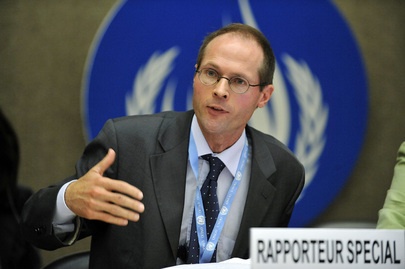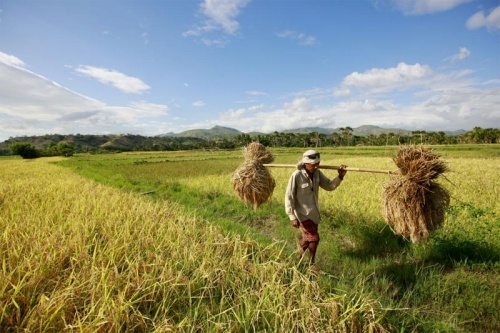

Current international trade regime & WTO is harming small farmers in the least developing countries (LDCs), significantly increasing their risk of food insecurity and reliance on large-scale producers, according to said Olivier De Schutter, (Top Photo), Special Rapporteur on the right to food. “Globalization creates big winners and big losers, but where food systems are concerned, losing out means sinking into poverty and hunger. A vision of food security that deepens the divide between food-surplus and food-deficit regions, between exporters and importers, and between winners and losers, simply cannot be accepted.” Read: - “Right to Food in Trade Practice as Human Right” -
diplomaticallyincorrect.org/films/blog_post/right-to-food-in-trade-practice-as-human-right-by-ambassador-mo/41861
Junk Food as Target:
One of Mr. De Schutter’s other targets has been “junk food,” both in terms of consumption and the resources co-opted to its success. Read: - “Curbing Unhealthy Food Industry Which Kills 3 Million – UN Expert” -
diplomaticallyincorrect.org/films/blog_post/curbing-unhealthy-food-industry-which-kills-3-million-un-expert-by-ambassador-mo/35192
Reliance Upon Trade that Magnifies volatile Swings?
According to Mr. De Schutter a trade-centric approach – strongly championed by the WTO – that is limiting the ability of LDCs to ensure their food security. “The food bills of LDCs increased five- or six-fold between 1992 and 2008. Imports now account for around 25 per cent of their current food consumption. These countries are caught in a vicious cycle. The more they are told to rely on trade, the less they invest in domestic agriculture. And the less they support their own farmers, the more they have to rely on trade.” Mr. De Schutter stressed that the international trade regime must acknowledge the dangers for poor countries in relying excessively on trade, as this exposes them to volatile grain prices, which can quickly change their landscape into one of poverty and hunger, felt by urban and rural consumer alike. .” See our 3 Part Interview – “WhyHunger @UN-Asking Questions & Seeking the Answers – Part 1” -
diplomaticallyincorrect.org/films/movie/whyhunger-un/29316
At Odds with World Trade Organization:
“We miss the simplest of win-wins. If we were to support developing world small-holders, who are often the poorest groups, we could enable them to move out of poverty, and enable local food production to meet local needs, In this context, trade would complement local production, not justify its abandonment. The urban poor would have access to fresh and nutritious foods, and the gap between the farmgate price and the retail price would narrow. This, however, requires policy space to limit price volatility at domestic level: it is this policy space that the WTO rules are reducing.” LDCs do not benefit from international trade according to Mr. De Schutter but are “victims of the pressure on land, water, and natural resources on which they depend, for which they increasingly have to compete with the agro-export sector.” READ – “State of Food Insecurity in World 2011” -
diplomaticallyincorrect.org/films/blog_post/state-of-food-insecurity-in-world-2011-un-report-by-ambassador-mo/36153
Mr. De Schutter called on the WTO to take these factors into account and ensure compatibility with the food security agenda to prevent vulnerable populations from experiencing endemic poverty and hunger. It is evident that when the WTO is the only “club” on trade that is aspired to by the global state community, Mr. De Schutter perceives it as impediment on several MDGs (Millenium Development Goals) promoted by the United Nations and multilateral body to which the WTO itself is part. These type of contradictions between different institutions within the UN fabric are not uncommon, although they are generally not so open and perhaps vehemently expressed.
Nonetheless, the WTO continues to gain new members and grow – it is perceived as the club that must be joined to announce a country’s presence on the global trade stage. Russia just joined, and China has been member for a decade. (Read & Also find list of members at – “Russia Joins WTO” -
diplomaticallyincorrect.org/films/blog_post/russia-joins-world-trade-organization-by-ambassador-mo/42918). From list it is evident that while some richer resource states are not yet WTO members, many of the poorest are also not either.
Nonetheless, Mr. De Schutter clearly believes that the current WTO policies, at least as they apply on trade and transfer of food are a dead end. “In the long term, poor net-food-importing countries will not be helped by being fed. They will be helped by being able to feed themselves. This is the consensus of the post-global food price crisis world that even the G20 has recognized. It is disappointing that the WTO continues to fight the battles of the past.” Mr. De Schutter also has expressed another food and trade related concern – “land grabbing” fueled by the expansion of global commodity industries including bio-fuels – Read: - “Land Grabbing Threatening Food Security” -http://diplomaticallyincorrect.org/films/blog_post/land-grabbing-threatening-food-security-by-ambassador-mo/35743
By Ambassador Muhamed Sacirbey
Facebook – Become a Fan at “Diplomatically Incorrect”
Twitter – Follow us at DiplomaticallyX
More Related Reports at:
“International Financial Crisis” Channel -
diplomaticallyincorrect.org/c/international-financial-crisis
&
“Humanitarian” Channel -
diplomaticallyincorrect.org/c/humanitarian



